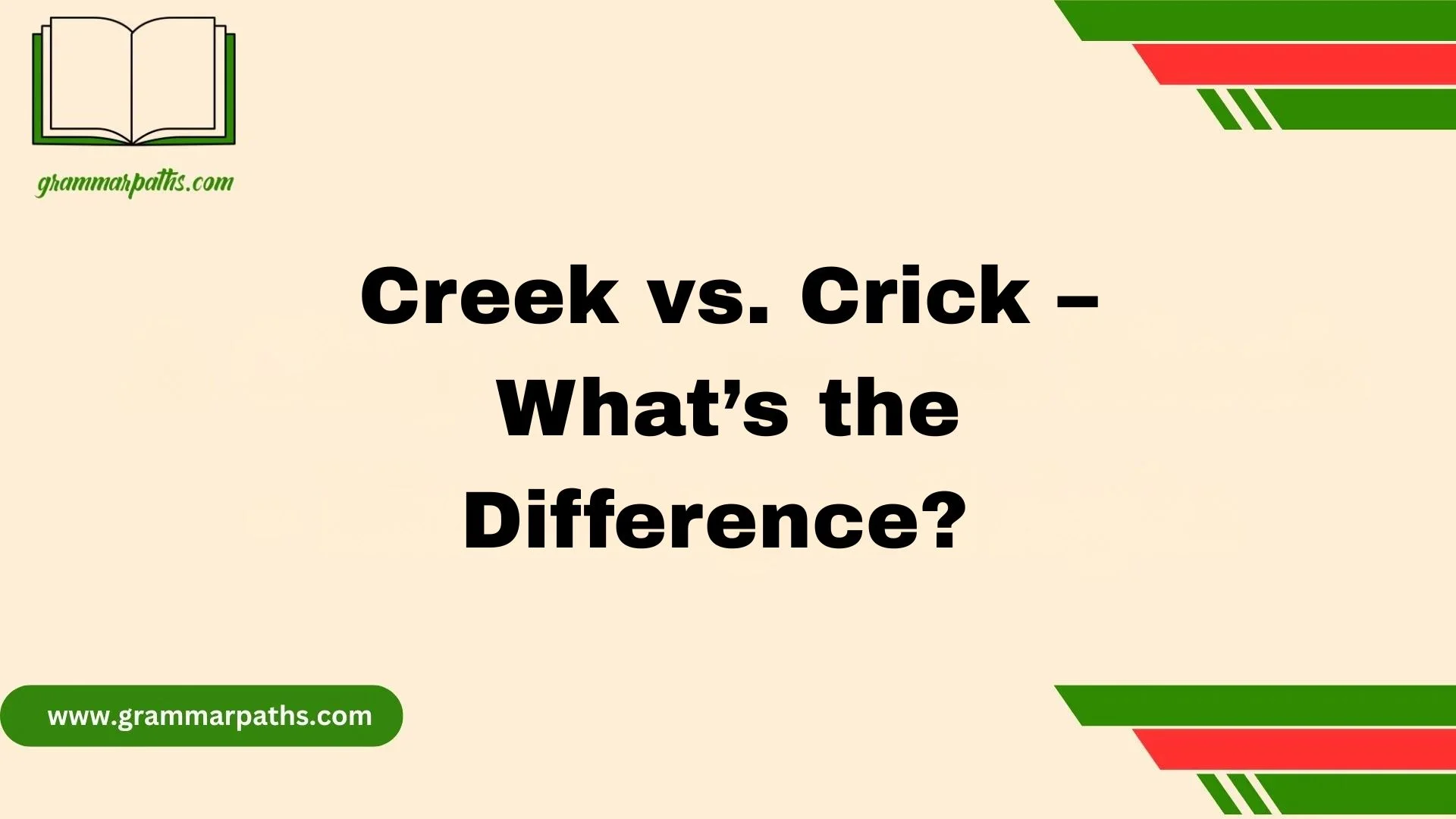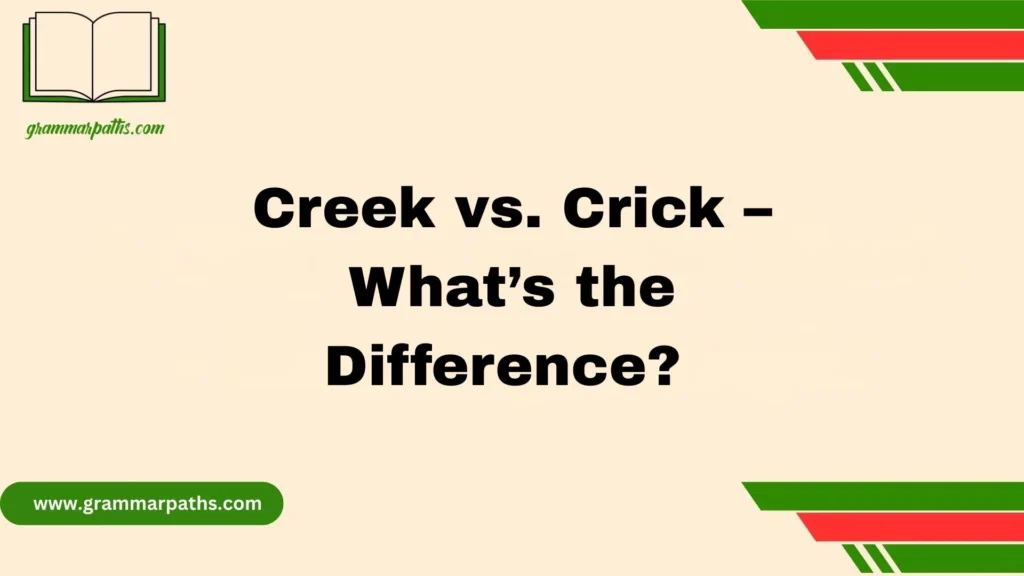Language often surprises us with subtle variations that seem confusing at first glance. One such example is the difference between “creek” and “crick.” While these two words look and sound similar, they carry unique linguistic, cultural, and regional distinctions that are worth exploring. For students, teachers, and writers, understanding these differences is not just about vocabulary—it’s about appreciating how dialects, pronunciation, and context shape the way we communicate.
The word “creek” is widely recognized as a small stream or waterway, commonly used in American English, literature, and geography. On the other hand, “crick” often appears as a dialectal variation or a colloquial pronunciation of “creek,” especially in rural or regional speech. Sometimes, “crick” can also refer to a stiffness in the neck or body, making it even more versatile depending on context.
For writers, knowing when to use “creek” versus “crick” ensures clarity and authenticity in storytelling. For teachers, it offers a chance to explain regional dialects and semantic shifts. And for students, it’s an opportunity to develop a deeper awareness of language evolution and cultural identity. This guide will break down the nuances so you can use each term effectively.
What Does “Creek” Mean?
In standard American English, a creek is defined as a small stream or tributary of a river. It’s usually larger than a brook but smaller than a river. Creeks play a vital role in geography and ecology, feeding into larger water systems and supporting local wildlife.
Dictionaries, academic texts, and professional writing all use creek as the correct form. For instance, the Merriam-Webster Dictionary defines creek as:
“A natural stream of water smaller than a river and often a tributary.”
Characteristics of a Creek
- Narrow and shallow compared to rivers.
- Flows through rural or suburban landscapes.
- Provides fresh water for farming, wildlife, and communities.
| Feature | Creek | River |
| Size | Small to medium | Large |
| Depth | Often shallow | Deeper |
| Flow | Moderate to gentle | Stronger, wider |
| Common Use | Local landmarks, small crossings | Transportation, trade, major waterway |
Creek remains the accepted spelling and pronunciation across academic, professional, and media contexts.
The Origins of “Crick”
The word crick developed as a dialectal pronunciation of creek, with roots in early American English. Settlers from different parts of Britain carried diverse speech patterns. Over time, those patterns mixed with regional influences in North America, giving rise to unique pronunciations.
Linguists suggest that “crick” survived in rural communities because spoken traditions mattered more than standardized spelling. In farming towns or small settlements, speech habits passed down through families preserved this form.
Unlike “creek,” which became the dictionary-approved spelling, crick lived on as a spoken variant, reflecting the colorful diversity of American English.
Regional Variations in Pronunciation
The choice between creek and crick often depends on where you live.
Where “Crick” Is Common
- Midwest – Iowa, Nebraska, Kansas, parts of Missouri.
- Appalachia – West Virginia, Kentucky, Tennessee.
- Rural South – Pockets of Arkansas, Oklahoma, and northern Texas.
In these regions, “crick” isn’t considered strange. It feels natural, tied to local identity. Meanwhile, in urban or coastal areas, “creek” dominates.
Why It Survives
- Regional pride: People keep pronunciations alive as part of cultural heritage.
- Oral storytelling: Rural communities rely on spoken traditions more than written ones.
- Social identity: Saying “crick” can signal roots or authenticity.
Think of it this way: just as some Americans say “y’all” while others say “you guys,” the “creek” vs. “crick” divide shows how pronunciation reveals where we come from.
Creek vs. Crick in Literature and Culture
Writers often capture the flavor of regional speech by choosing crick in dialogue or narration. This helps readers hear the voices of rural characters and understand the cultural setting.
Examples in Literature
- Mark Twain used regional speech patterns in The Adventures of Huckleberry Finn, where non-standard pronunciations gave characters authenticity.
- Local color writers of the 19th and 20th centuries (such as Sarah Orne Jewett or Willa Cather) frequently relied on dialect to paint vivid portraits of American life.
Cultural Identity
The use of crick connects to folklore, folk songs, and storytelling traditions. For example, many Appalachian ballads mention rivers and creeks—sometimes pronounced as “crick”—to ground the story in local geography.
Standard Usage: When to Use “Creek”
When writing for school, work, or professional audiences, you should always use creek. Dictionaries, style guides, and media outlets agree that creek is the correct form.
Where “Creek” Is Standard
- Academic essays.
- News reports and journalism.
- Scientific research on geography or ecology.
- Business or professional writing.
Using “creek” avoids confusion and maintains professionalism. Even if you grew up saying “crick,” switching to “creek” in writing ensures clarity.
When “Crick” Is Acceptable (and Even Powerful)
In creative writing, “crick” shines. It can make characters sound authentic, especially if they come from regions where the pronunciation is common.
Example
Imagine a novel set in rural Iowa. A character saying, “We’ll meet down by the crick” sounds truer to life than, “We’ll meet down by the creek.”
“Crick” signals background, community, and even nostalgia. Many readers associate it with a simpler, country way of life.
Idioms and Expressions with “Creek”
Idioms in American English almost always use creek, not crick. These expressions highlight how standard spelling dominates in figurative language.
Common Idioms
- “Up the creek (without a paddle)” – in trouble, stuck in a bad situation.
- “Till the creek rises” – until something changes or interrupts plans.
- “Don’t cross the creek before you come to it” – don’t worry about problems before they arrive.
Idioms stick to standardized forms because they spread through books, newspapers, and education systems, not just oral tradition.
The Dual Meanings of “Crick” in American English
Interestingly, crick carries more than one meaning.
- Crick (stream) – A dialectal pronunciation of creek.
- Crick (ache or stiffness) – As in “a crick in the neck.”
These meanings are unrelated, but both are common in everyday American speech.
| Term | Meaning | Example Sentence |
| Crick (stream) | Regional word for creek | “We went fishing down by the crick.” |
| Crick (stiffness) | Pain or spasm in neck or back | “I woke up with a crick in my neck.” |
The second meaning (neck pain) appears nationwide, while the first (stream) is regional.
Practical Writing Tips: Creek vs. Crick
Writers often struggle with when to use each form. Here’s a simple guide:
| Context | Best Choice | Why? |
| Academic writing | Creek | Standard, formal, universally understood. |
| News or journalism | Creek | Matches professional style guides. |
| Creative fiction | Crick (sometimes) | Adds regional authenticity. |
| Dialogue (rural character) | Crick | Captures voice and culture. |
| Everyday professional use | Creek | Maintains clarity. |
Rule of thumb: Use creek for clarity, but don’t be afraid of crick when character voice or setting demands it.
Conclusion
The comparison between “creek” and “crick” highlights the richness and flexibility of the English language. While “creek” is the standard word for a small stream, “crick” often reflects regional dialects or an alternate meaning like neck pain or stiffness. For students, teachers, and writers, recognizing this difference is not just about spelling or pronunciation—it’s about understanding cultural context, communication clarity, and language diversity.
By paying attention to how these words are used, you can make your writing more authentic, accurate, and relatable. Whether you’re studying English, teaching vocabulary, or crafting a story, knowing when to use “creek” versus “crick” will strengthen both your language skills and your awareness of how words carry meaning across different regions and audiences.
FAQs
Q1: Is “crick” a real word?
Yes. “Crick” is used both as a regional variation of “creek” and as a word for neck or body stiffness.
Q2: Do people still say “crick” today?
Yes. It’s still common in some rural areas, dialects, and informal speech.
Q3: Which is correct—“creek” or “crick”?
Both are correct, but “creek” is the standard spelling in formal English.
Q4: Should writers ever use “crick”?
Yes, if you want to reflect regional speech, dialect, or authenticity in storytelling.
Q5: What’s the best way for students to remember the difference?
Think of “creek” as the formal waterway term, and “crick” as either informal dialect or neck stiffness.

Emma Brooke is a passionate language expert and contributor at GrammarPaths.com, where she helps learners navigate the complexities of English grammar, idioms, and effective writing. With a strong academic background and years of teaching experience, Emma excels at turning tricky grammar rules into simple, practical lessons that readers can easily grasp.












